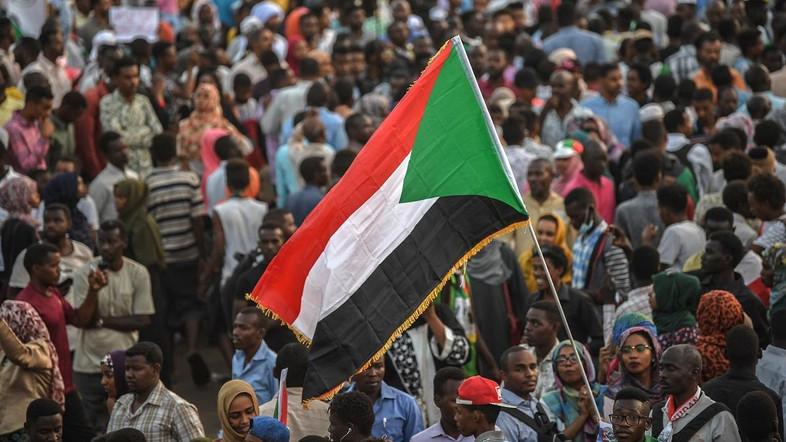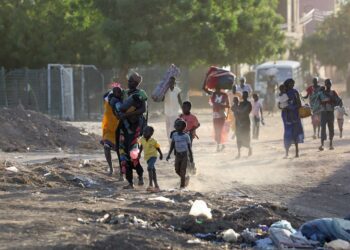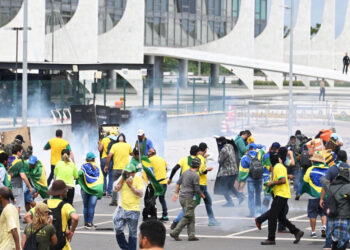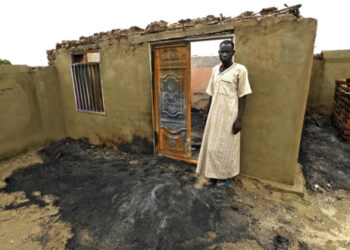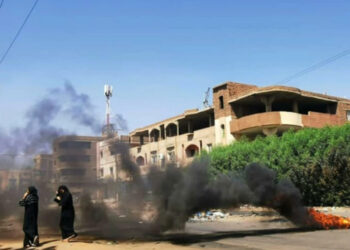Throughout Sudan, the words “the blood of the martyr is my blood, the mother of the martyr is my mother” could be heard in Arabic following the killing of over 100 protestors in early June, and as people prepare to take the streets again on June 30, there are fears that more people could die as a result of military force.
June 30 marks the date former President Omar al-Bashir came to power after ousting the elected president in 1989, which resulted in almost three decades of dictatorship. Choosing this symbolic date, activists have organized mass peaceful protests throughout Khartoum to fight back against military rule.
In April, protestors succeeded in ousting al-Bashir, and the Transitional Military Council assumed control of the government to oversee the transition of power. However, activists wanted a civilian government in charge, so they held peaceful sit-ins outside the TMC’s headquarters to urge its leaders to hand over power to civilian leadership, which the Council has refused to do.
Sudanese protesters hoped that the ouster of president Bashir would signal a break from 30 years of abuses.
Instead, Sudan’s de facto leaders have promoted the same security forces that led the attack on the Khartoum sit-in on 3 June, killing well over 100 protesters… pic.twitter.com/SaMfCsQXpS
— Andrew Stroehlein (@astroehlein) June 26, 2019
Ahead of the June 30 protests, the TMC is trying to provoke the peaceful protestors to become violent, so that they are able to justify their use of deadly force, said Dimah Mahmoud, a Sudanese activist with a doctorate in Sudanese foreign policy.
“We are seeing the trucks of weapons left around the corner to try and provoke the peaceful protestors into picking up arms, you have the leaders of the community picking up these weapons and taking them to the police station and saying, give them back to the Military Council we are not going violent,” Mahmoud told The Globe Post.
Despite the fear that military forces are going to be violent on June 30, Mahmoud says that pro-democracy protestors will remain peaceful until a compromise is met with military leaders.
“We are extremely proud people, we will not fight for a life where we have no integrity, where we have no dignity,” said Mahmoud.
Activists also said that the United States has had a key role in the killing of pro-democracy protestors on the night of June 3. The weapons the TMC and Rapid Support Forces are using come directly from Saudi Arabia and the United Arab Emirates, who get them from the U.S. government, Mahmoud said.
“The weapons that are being used to massacre innocent, non-violent, unarmed protestors in Sudan are American weapons that were sold to the Emirates and Saudi Arabia,” she argued.
Just as recently as June 21, President Donald Trump authorized $8 billion in weapons sales to Saudi Arabia, the UAE, Jordan, in a move that defied Congress. Mahmoud said she wants the U.S. to stop selling weapons to these countries until they stop interfering in Sudan.
However, Makila James, the deputy assistant secretary for East Africa and The Sudans at the State Department, said at a Congressional hearing on Tuesday that the U.S. does not want to see more violence in Sudan and that they have been in contact with military leaders to dissuade them from using lethal force.
“We are very concerned about the potential for violence for June 30. We’ve also been conveying very strong messages to the TMC that they must allow peaceful protest, that if there is any repeat of the violence we saw on June 3 then there will be consequences and that people have a right to protest, because we are anticipating that there will be major activities on the date of June 30,” said James.
Sudan is also currently in the midst of a complete media blackout, including internet and phone service. Restoring internet access is the top priority for Sudanese activists as they said it is critical for holding military forces accountable. Currently, the only way for videos or information from inside Sudan to get out is through advanced hacking to gain access to the internet. Sudanese protestors then send whatever limited videos and pictures they can to Sudanese diaspora around the world for them to share on social media.
“Our people have to document what is happening, record it, send it to us so that we can send it to the world, while their being shot, while their being tortured, while they are being raped,” said Mahmoud.
Day 23: since internet was shut in #Sudan & since more than 120 peaceful protestors were murdered by MTC/Janjaweed in Khartoum & many remain missing. Cost of shutdown is now more than $1 billion. A millions march is now planned for June 30 in Sudan & by diaspora. #SudanUprsinig pic.twitter.com/PoNQZJs7fu
— Dalia Haj-Omar (@daloya) June 26, 2019
A resolution for the tense political situation is proving increasingly difficult to meet. At the end of May talks between protest leaders, represented by Forces for Declaration of Freedom and Change, and the TMC broke down, which led to the attacks on June 3. Then in mid-June Ethiopia and the African Union proposed a compromise that would see seven civilians, seven military leaders, and one impartial individual form a government until elections could be held. The protest leaders accepted this proposal, but TMC leaders quickly shot down the compromise.
The TMC is currently in the position of power when it comes to negotiations because they have the backing of Saudi Arabia, UAE, and Egypt, according to Mahmoud. Also having the Rapid Support Forces, known as the Janjaweed, at their disposal is critical for their ability to carry out fear-mongering agenda.
For the TMC to come to the negotiating table and transition to democratic rule, Mahmoud said, there needs to be international pressure on the Arab nations to stop meddling in Sudan.
“There has to be a counter effort to the counter-revolution and the counter-revolution right now is predominantly Arab. And so America for example with its leverage, with its power through its allies, Saudi Arabia and the Emirates and even over Egypt, has a responsibility to say hands off Sudan, has a responsibility to say stop sending the weapons we are sending you to Sudan, has a responsibility to say, if you don’t take this seriously we have to take other measures because you are effectively suppressing democracy,” said Mahmoud.
Special Envoy on Sudan Donald Booth traveled to Khartoum June 22 through 26. In his numerous engagements, Ambassador Booth reiterated U.S. support for a civilian-led transitional government broadly supported by the Sudanese people. https://t.co/wf30PwQO5H pic.twitter.com/8FP9gds3rZ
— U.S. Embassy Khartoum (@USEmbassyKRT) June 27, 2019
During the Congressional hearing, James mentioned the U.S. has looked into visa and economic sanctions to ease the conflict in Sudan. However, Mohammed Khader, a member of the United Nations Major Group for Children and Youth with an expertise in foreign policy and national security, said that these sanctions will not help solve the crisis.
“They won’t stop the role of foreign interference, which is primarily one of the main issues,” said Khader. “Those won’t be effective, those are just procedural things done by OFAC [Office of Foreign Assets Control] and the State Department.”
Currently, the U.S does not have a permanent ambassador to Sudan, and according to Khader, this is one of the most important steps the U.S government can take to support the pro-democracy activists in Sudan.
In the U.S Sudanese activists will be marching from Capitol Hill to the White House on June 29 to try and raise awareness and shine an international spotlight on Sudan to discourage military forces from taking more protestors lives.
“It’s our way of keeping an eye and keeping the pulse on what is happening in Sudan,” said Mahmoud.
Saudi Arabia, UAE Want a Dictator to Remain in Power in Sudan, Expert Says


